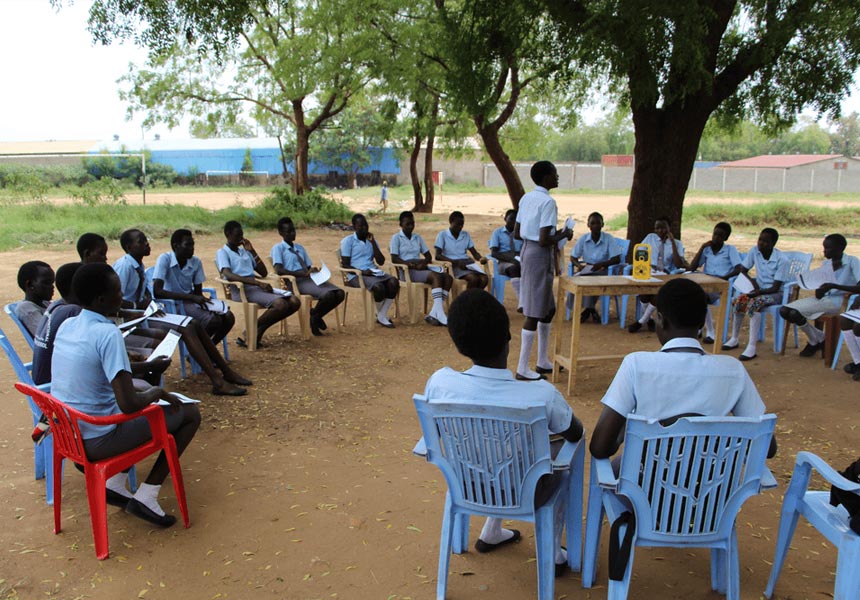International
 Girls need education for personal empowerment, for employment or income generation, and to support overcoming poverty.
Girls need education for personal empowerment, for employment or income generation, and to support overcoming poverty.
South Sudan came into existence in July 2011 following the signing of a Comprehensive Peace Agreement in 2005 and a referendum in January 2011. Prior to independence, decades of civil war left over 2M people dead and 4M displaced, creating a highly militarised and fractured society and a population reliant on humanitarian aid for their survival.
Within this complex national environment, South Sudan faced significant challenges in its educational system, with poverty impacting education participation as, traditionally, boys are prioritised when families struggle to cover schooling costs. In 2011, just 38% of children who were girls went to school. With almost half of South Sudan’s population under the age of 18, educating girls and marginalised children is the most efficient approach to:
- Breaking the cycle of intergenerational poverty
- Lifting families and communities from marginalisation
- Contributing to reducing the factors that cause in-country conflict
- Reducing the risk girls face of early or forced marriage
The Girls’ Education South Sudan (GESS) programme has supported the Government of the Republic of South Sudan since 2014. GESS2 – the second phase of the programme – is a £79M five-year programme that started in 2019, supported by a multi-donor partnership between the governments of the UK, Canada, EU, United States, Sweden, and Norway. Mott MacDonald Cambridge Education leads delivery with BBC Media Action, Montrose International, and Windle Trust International, together with seven NGOs that implement the programme in the ten state clusters and three administration areas of South Sudan.
Our GESS2 Theory of Change roadmap sets out the approach to reduce barriers to education access, improve enrolment, and accelerate educational attainment for all children, especially girls and marginalised children such as those with disabilities. Activities that contribute to achieving these outcomes are delivered through five core outputs: behaviour change and community outreach to create a conducive environment for equitable education; cash transfers to support access; funding to schools to improve the learning environment; interventions to support improved quality of education; and research and evidence investments to improve the knowledge base on ‘what works’ and enhance the availability and reliability of education sector data.
Through our consortium’s delivery of the programme, we have achieved some impressive outputs:
- Girls’ participation in education increased from 38% of children in 2011 to 49% in 2023
- The number of girls enrolled in school increased from 540,000 in 2011 to over 1.2M in 2021
- In 2023, 425,000 schoolgirls were validated to receive a cash transfer
- Trained 2,500 teachers to raise the quality of teaching
- Reached 4,500 school management committees to improve school governance
- Mentored 70,000 pupils
- Built capacity of 1,500 education managers
The Girls’ Education South Sudan programme embodies Mott MacDonald’s purpose: to improve society by considering social outcomes in everything we do. Our unwavering commitment to communities underscores our belief that access to education is a fundamental human right for every young person in South Sudan.
View the Mott MacDonald profile in the MCA Members Directory.

